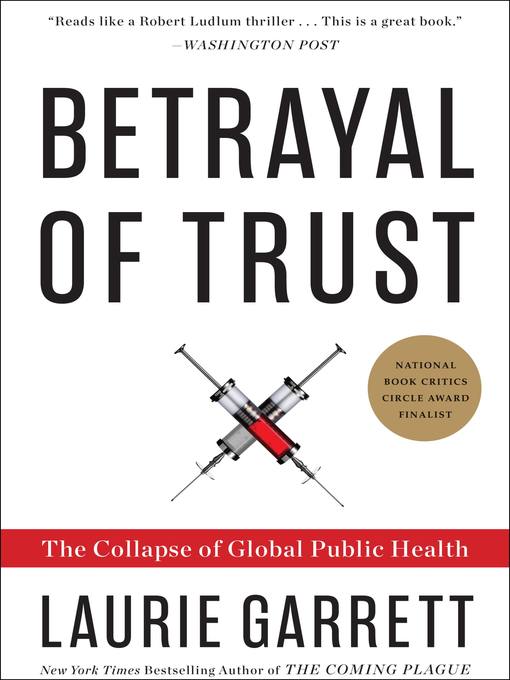
Betrayal of Trust
The Collapse of Global Public Health
کتاب های مرتبط
- اطلاعات
- نقد و بررسی
- دیدگاه کاربران
نقد و بررسی

Starred review from July 31, 2000
On a par with Rachel Carson's Silent Spring, this chilling exploration of the decline of public health should be taken seriously by leaders and policymakers around the world. Garrett, a Pulitzer Prize-winning journalist for Newsday (The Coming Plague: Newly Emerging Diseases in a World Out of Balance), has written an accessible and prodigiously researched analysis of disaster in the making in a world with no functioning public health infrastructure. In India in 1994, neglect of public health for the poor led to an outbreak of pneumonic plague; the once-dreaded disease is now easily treatable with antibiotics, but the failure of Indian authorities to quickly reach a diagnosis and provide accurate information resulted in a worldwide panic. The former Soviet Union, for all its flaws, according to Garrett, assured every citizen access to health care. After the U.S.S.R.'s breakup, the Russian economy collapsed. With no funding left for health care, Russia was overwhelmed by a tuberculosis epidemic. Even the U.S., historically a pioneer in public health (this commitment was demonstrated by New York City's quick and successful response to an 1888 cholera epidemic, as well as the tenement reform movement of the early 1900s that helped eliminate diphtheria), is lagging today. During the Reagan administration, Garrett says, budget cuts dramatically weakened public health while also denying poor Americans access to medical care. The author believes that the medical challenges posed by the epidemic spread of AIDS in Africa, by drug-resistant microbes carried from one country to another and by the danger of biological warfare can be met only by a cooperative global movement dedicated to strengthening public health infrastructures. Garrett sounds the alarm with an articulate and carefully reasoned account. Author tour; NBC Today appearance.

Starred review from September 1, 2000
Turning her attention to the frightening condition of public health throughout the world, Pulitzer Prize-winning science reporter Garrett repeats the call for action she initiated in her tremendously successful The Coming Plague. Re-emerging diseases, antibiotic-resistant superbugs, and biological terrorism are increasing threats that can only be conquered through significant attention to worldwide public health. Garrett provides an in-depth look at public health programs in several different geographic areas and analyzes their successes and failures. The author shows clearly that successful public health programs require a fragile bond of trust between the people and their government, and she details the critical effects of politics and economics on public health infrastructures. Her endnotes, which might constitute a book in themselves, offer a tremendous resource for additional research. Completely readable for general readers and experts alike, this reasonably priced book is highly recommended for all libraries.--Tina Neville, Univ. of South Florida Lib., St. Petersburg
Copyright 2000 Library Journal, LLC Used with permission.

Starred review from August 1, 2000
In her surprise best-seller "The Coming Plague" (1994), Pulitzer Prize^-winning "Newsday" reporter and former NPR science correspondent Garrett drew readers' attention to emerging, antibiotic-resistant diseases. Her primary recommendations were more (and more effective) public-health fieldwork, research, and preventive medicine. In "Betrayal of Trust," Garrett's subject is public health itself: the desperate inadequacy of public-health infrastructure in much of the developing world and the shocking neglect of that infrastructure in "developed" nations. Garrett moves from the relatively simple inadequacies revealed by the 1994 pneumonic plague outbreak in India and the 1994 Ebola epidemic in Zaire to a nuanced analysis of the issues involved in the near-total collapse of public health in the former USSR and the years-long underfunding and lack of respect for this key government responsibility in the U.S. (Her U.S. chapter pays special attention to public health in New York City, Los Angeles County, and the state of Minnesota.) Garrett's "biowar" chapter makes clear that the threat of biological terrorism has gained the attention of world (and U.S.) leaders, but their responses to date have been dominated by a military (rather than public-health) mind-set. Dramatic changes in attitudes as well as resource allocation will be needed to construct a public-health infrastructure capable of coping with the myriad challenges of globalization. ((Reviewed August 2000))(Reprinted with permission of Booklist, copyright 2000, American Library Association.)

























دیدگاه کاربران